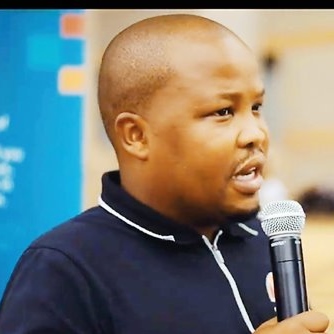
SA

Nkomo’s journey from BDS to Zionist
JORDAN MOSHE
In 2014, he visited Israel for the first time and discovered that he had been grossly misled, and today he urges others to become better informed before taking sides in the conflict.
Nkomo is a candidate for the provincial legislature of Gauteng. He is a former student leader, previous chairperson of the Congress of South African Students, and member of the Wits 11 group that disrupted the piano recital of Israeli pianist Yossi Reshef in 2013.
Speaking at the University of the Witwatersrand (Wits) on Monday and the University of Cape Town on Wednesday, Nkomo shared his experience of Israel with student audiences at the invitation of the South African Union of Jewish Students (SAUJS).
“I am no expert on the conflict,” he said. “When I was with BDS, I was a young man who was an activist for change in the world. I knew about the oppression of the Palestinians and wanted to do something to change it.”
He explained that his interaction with the conflict was filtered through his political involvement. “When I joined BDS, the material used to introduce to the conflict was a video called Palestine 101. It depicts a conflict in which children are always dying, where life is basically a war zone every day.
“It made you believe that when you think Israel, you think apartheid state… that it’s a war zone with big guns killing innocents. Every day it’s Goliath versus David and David never wins. I never believed people lived normal lives there. I thought it was always a war zone, with mass graves and death every day.”
A keen political activist, Nkomo involved himself in multiple demonstrations and protests, pushing for the liberation of the Palestinian people. “I would lead protests to challenge conflict. I was very threatening. With other student leaders at Wits, we made the decision to oppose all engagement with Israel,” he said.
“Our office at Wits was opposite that of SAUJS. They never had a moment’s rest from us, and we did horrible things to them. We put stickers on their doors all the time, and yelled at them to stop the oppression. That is what we were taught to do. We were taught to boycott anything connected to Israel. If a person said he was a Zionist, I had to boycott him because he was racist.”
Nkomo eventually accepted an opportunity to visit Israel in 2014, after refusing to do so for six months. He decided he wanted to gain a better understanding of the situation. “I chose to take a chance and see for myself. I was anti-Zionism and anti-Israel.”
When he arrived and was taken to his first stop, Ramallah, he found nothing that corresponded to what he had been taught. “There was no war zone. I asked a Palestinian guy where it was – where the dead people and the guns were. I didn’t know what was going on. I felt this is not what I was taught!”
Nkomo went on to visit both Israeli and Palestinian areas, including the West Bank and Jerusalem. For the first time ever, he said, he was able to connect with actual people involved in the conflict and learn what it actually meant to them. “I saw that in everything I had learned there was no true reflection of who they are as people.”
Upon his return, he made the decision not to stop being pro-Palestinian, but to become a pro-human being. He decided he would no longer accept narratives blindly but establish the truth himself. “When I came back, I wanted a meeting with leaders of BDS. It went downhill very quickly. I was accused of being anti-Palestine and a sellout. I said that no matter how much hate you have, you can’t hate an entire nation. Even if I’m angered by them, I can’t hate all of them. But they didn’t listen.
“Until today, I still get responses from people that are harsh, saying I’m a traitor. Sadly, I can see where they come from. I come from their position, and I know that’s what they teach you.”
Nkomo said that as an African, he had come to understand that Zionism is not racism. “I’m a proud African, and this speaks to Zionism. It’s not racism. It’s the self-determination of the Jewish people. The Palestinians can do the same thing. Unfortunately, they are divided. Gaza is divided by Hamas and Fatah – it doesn’t work for them.”
He said extreme lobby groups on either side achieved nothing and harmed their causes, if anything. “I have a problem with the approach of BDS. They ignore and shut out enjoyment. You cannot close your eyes like that. This does no justice to the cause.”
Instead, he maintained, people had to develop their own informed perspective, no matter which side they wanted to support. “I don’t want to be told by the media how to interpret the conflict. Being African, we obviously want to sympathise with the Palestinians, because they are marginalised.
“There are actually marginalised voices on both sides. There are casualties on both sides. I am pro-human beings. I am here to support people. We have reduced ourselves to saying ‘choose one of them’. Whether you are on one side or the other, there is no justification for killing. No stabbing or rockets. Use of violence to achieve a solution is essentially building the next generation of destruction. The only benefactor in destruction is the grave.”
He concluded: “Be brave enough to identify where a view come from. Don’t go into discussions blindly, and know what you are subscribing to. Boycotting discussion can never lead to a beneficial solution. Leaders must speak and engage, informed by peace as the ultimate solution.”




